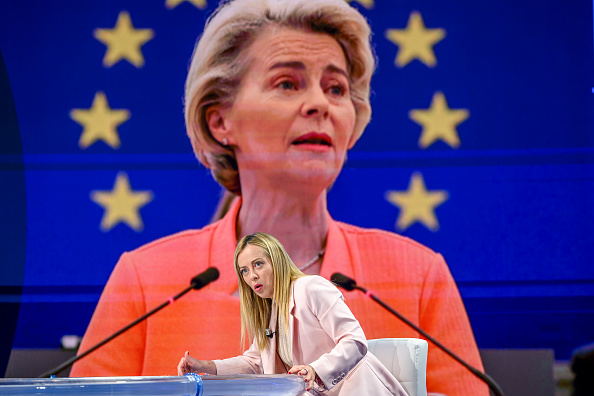Ivan Korčok, a critic of PM Robert Fico, won a surprise first-round victory in Slovakia’s presidential elections March 23, defeating Fico’s ally Peter Pellegrini by five points.
The race sets up a high-stakes challenge for PM Fico in its final round on April 6.
Outgoing president Zuzana Caputova has been Fico’s adversary, and a hindrance to the PM’s plans for judicial reform and reversing the country’s support for Ukraine.
A victory for Korčok, who has similar views to Caputova, would mean Fico facing a second consecutive president who would use the office’s powers to block his policy aims.
If Pellegrini, a former close political ally, replaces Caputova instead, Fico will have a much easier political path.
Though Slovakia’s presidency is largely ceremonial, the head of state has the powers to veto laws and appoint senior judges.
Korčok trailed in recent polls but gained 42.5 per cent of first-round votes, against Pellegrini’s 37.
Pellegrini, with 37.5 per cent, had led Korčok, on 36.3 per cent, in an Ipsos poll on March 20, the last before the election,
The race is still tight enough to require a second round, as neither candidate reached 50 per cent.
Given the crowded first-round field of 11, in the second round “much will depend on potential endorsements from rival candidates,” says Jozef Hrabina, country director for Slovakia at Areterapa, a public affairs advisory firm in Central and Eastern Europe.
Pellegrini likely will benefit from support from the third-place candidate, former Supreme Court chief Štefan Harabin (with 12 per cent), though Harabin says he himself will not vote for Pellegrini.
Fico has also aggressively courted the support of fourth-place Krisztián Forró, head of a party which represents Slovakia’s Hungarian minority. In January, he met Forró and promised him a new law on the legal status of minorities.
For his part, Korčok would attract support from the fifth place contender, ex-PM Igor Matovič, standing on an anti-corruption platform (with 2 per cent).
“Turnout will be key” in the second round, with large “headwinds against Korčok” from Harabin’s vote swinging behind Pellegrini, predicts Charles Tannock, a former British MEP.
Korčok has tried to lure voters on the Right, by appealing heavily to patriotism and campaigning in regions with a strong nationalist, hard-Right, and working-class voter base.
This quest “will likely prove unsuccessful,” because those voters will distrust his backing from centre-Right and liberal parties, predicts Hrabina.
More broadly, Korčok is likely to suffer from association with the unpopular Matovič government, in which he was foreign minister.
Matovič resigned in April 2021, and was distrusted by 91 per cent of the Slovakian public in a September 2022 poll.
In a subdued election campaign until now, both Pellegrini and Korčok benefit from being senior political figures in Slovakia.
Pellegrini is currently speaker of Slovakia’s parliament, and was PM from 2018-2020.
Korčok was foreign minister from 2020-2022, and a career diplomat for 28 years before that.
Pellegrini is leader of the social democratic Hlas (‘Voice’)-SD party, and is endorsed by Fico’s Smer-SD, its coalition partner.
Korčok, standing as an independent, is supported by the leading opposition party, the centrist-liberal Progressive Slovakia.
The party is trying to frame the vote as “a referendum on the performance of the Fico Government”, adds Hrabina.
Fico can point to some successes in his six months as PM, including construction law reforms which could speed the construction of highways and railways, and moves to stabilise household energy prices.
Pellegrini, if elected, would need to step down as head of HLAS-SD, which split from SMER-SD in 2020.
This could mean that his party, lacking a clear leader, could potentially reintegrate into Fico’s, boosting the PM’s position in parliament, Teneo’s Andrius Tursa argues.
Slovakian elections also kick off a crowded 2024 election season in Europe.
And, perhaps in a sign of things to come, there has been ample election disinformation, including AI-generated video.
Social media posts late January accused Korčok of collaborating with the country’s Communist-era secret police, says the Central European Digital Media Observatory. (The claims are false, say Slovakia’s Nation’s Memory Institute and the Security Services Archive.)
A deepfake video showed PM Fico endorsing an investment website, in a scam to collect personal information.
Other posts showed a fabricated image of former prime minister Matovič’s purported US passport, as well as an alleged driving licence stating he is only allowed to drive under supervision.
Away from the realm of deepfakes, opinion polls have shown Pellegrini as the likely winner in a run-off with Korčok.
These polls, though, also failed to predict Korčok’s five-point victory in the first round.
With stakes for Fico that could not be higher, if the election’s first round has been subdued, the second round is unlikely to be so.





